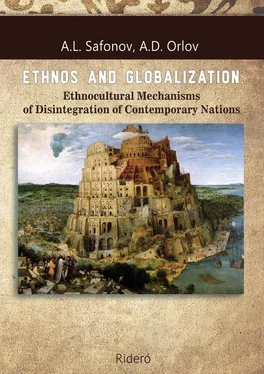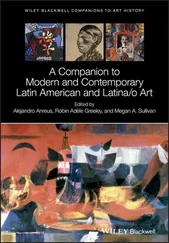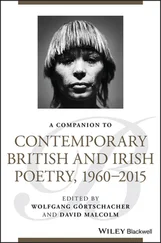The concept of the “hybridization’ of society that presupposes the process of cultural, racial, ethnic mixing and miscegenation 121 121 Prazauskas, A. A. Ethnonationalism. Multinational state and globalization processes // Polis. 1997. №2 – p. 95—105.
has gained some traction. Therefore, hybridization is a model of a slowed-down convergence that reduces new entities to mechanic superposition, overlaying already known phenomena and entities.
According to Guseynov, 122 122 Guseynov, A. A. Individual and nation in light of globalism // Eastern Christian Civilization and Eastern Slavic Society in the Contemporary World. M., 2001. – p. 25—33.
globalization is the transformation of long-standing, rather independent (although capable of complex interactions) cultural-civilizational and nation state forms of social life into a single system including all of humankind. This new system inevitably takes a stand against those forms of collective life which it is supposed to replace in a new, wider, inclusive (to the point of being universal) synthesis.
The confrontation of the global and the local becomes especially evident, and dramatically antagonistic, when globalization moves beyond economy to take over cultural, political and ideological (in a wider sense, including outlook, mentality) spheres.
According to Stepin, globalization is a choice between the two scenarios, which are called the “golden billion” concept and the “dialogue of civilizations” concepts. 123 123 Stepin, V. S. About Types of Civilizational Development and Future Scenarios. The Time of Changes and Future Scenarios. M., 1996. – 368 p.
The golden billion concept stems from the idea of globalization as the rule, the triumph of Western civilization and the Western peoples, “the end of history” 124 124 Fukuyama, Francis (1989). “The End of History?”. The National Interest (16): 3—18
The rest should strive to become more like them under the threat of being relegated to an existence on the periphery or the semi-periphery. In the same manner, the future global society is seen as a semblance of the feudal and hierarchical system in the centre, with concentric circles of various levels around it.
The concept of the “global human ant hill” (Cheloveynik), as a final and definitive variant of the integration of humankind within the Western paradigm, was sociologically forecast and shown in the work of Zinoviev. 125 125 Zinovyev, A. A. Global Anthill. M., 1994. – 448 p.
The events of the last two decades provide objective proof that globalization, as the establishment of a qualitatively more connected and homogenous global environment, does not lead to the extinction of the formed social communities, similarly to how biological evolution in ecosystems does not lead to a decrease in biodiversity. As a result, despite the obviously outdated nature of religious and ethnic social institutions, the influence of ethno-religious and ethnocultural processes across the world is increasing as the migration flows across states are increasing, the state institutions are losing their significance and, consequently, the nation state identity is weakening, being replaced by an ethnic and religious identity.
From that point of view, the epoch of globalization is analogous to the axial age – a pivotal age of the formation of the first local civilizations, introduced by Karl Jaspers – the secession and the setting apart of the political sphere and, as a consequence, the appearance of the largest global denominations that defined the global history for ages to come. 126 126 Safonov, A. L. Axial Age 2: return to origins or descent into darkness? // Vestnik Buryatskogo Universiteta. Issue 14 (Philosophy, Sociology, Political Science, Culturology). Ulan-Ude, 2012. – p. 34—42.
Consequently, globalization is not a gradual evolutionary approach to the only possible equilibrium point, but a global crisis during which catastrophic and, accordingly, essentially unpredictable major changes occur in the global society, linked to the establishment, development and extinction of a wide range of social agents as a result of an increasing global confrontation that is not limited by spatial barriers.
As a consequence, a global economic empire, even if it swallows the whole world, gives rise to new processes of structuration and divergence inside itself, undoubtedly begetting the possibility of a historical choice, a bifurcation of the historical process.
At the same time, the main consequence of the variability of global development and the increase in the number of agents in a new global world is the undoubtedly uncontrollable nature of global sociohistorical development that reaches its peak during historical crises.
The concept of the dialogue of civilizations, justifiably assuming that the sociocultural sphere is not a carbon copy of economic processes, proposes the principle of equality of civilizations, cultures and peoples, and sees the ideal global society as unity in diversity.
In fact, the concept of the dialogue of civilizations is a cover for the global periphery already formed to counter the pressure of the West in terms of the unification of culture and values, and to work out its own project for the existence in a united world. Seen from this angle, globalization is a challenge for the cultural, civilizational and national identity, which is applicable to all development scenarios, including the concept of the dialogue of civilizations. 127 127 Guseynov, A. A. Individual and nation in light of globalism // Eastern Christian Civilization and Eastern Slavic Society in the Contemporary World. M., 2001. – p. 25—33.
Nevertheless, it should be noted that the process is currently happening in a somewhat different way – that is to say, an ideology of the supremely wide community, the people of the Western world, the “golden billion’, is being formed, which caters for global confrontation in the sphere that is responsible for material wealth. A confrontation is inevitable within a new global community, as the fight for natural resources is gaining momentum due to the exponential increase in population size, in particular. Ideology is a subjective, collective look at the reality.
At the same time, the idea of the dialogue of civilizations as an ideal and almost conflictless development, presented as an alternative to the reality of globalization and the real strategy of globalization, is not an actual alternative: at best it is an ideal tendency, if not wishful thinking. The idea is rooted exclusively in theory and fails to make it not only through the test of societal practice, but through detailed work, a creation of a local applied model of such a dialogue. While real interests and agents of the global process are behind globalization, the universal theoretical idea of the dialogue of civilizations does not seem to be powered either by economic interests that would outweigh the benefits of globalization for elites, including local ones, or by agents, not only interested in symmetrical, equitable dialogue, but capable of organizing it.
There does not seem to be a referee overlooking the fight, someone interested and capable of forcing dialogue participants to reach a consensus that is not simply defined by economic or some other kind of power wielded by the participants during which life or death issues are being solved. The result of direct interaction between a wolf and a lamb, without any mechanical or spatial barriers, is evident; the weaker side calls for equal dialogue notwithstanding.
Ultimately, the idea of the dialogue of civilizations is at best one of the forms taken by the losers’ plea with the winners for mercy, a form of integration into a Western model of globalization.
Читать дальше












